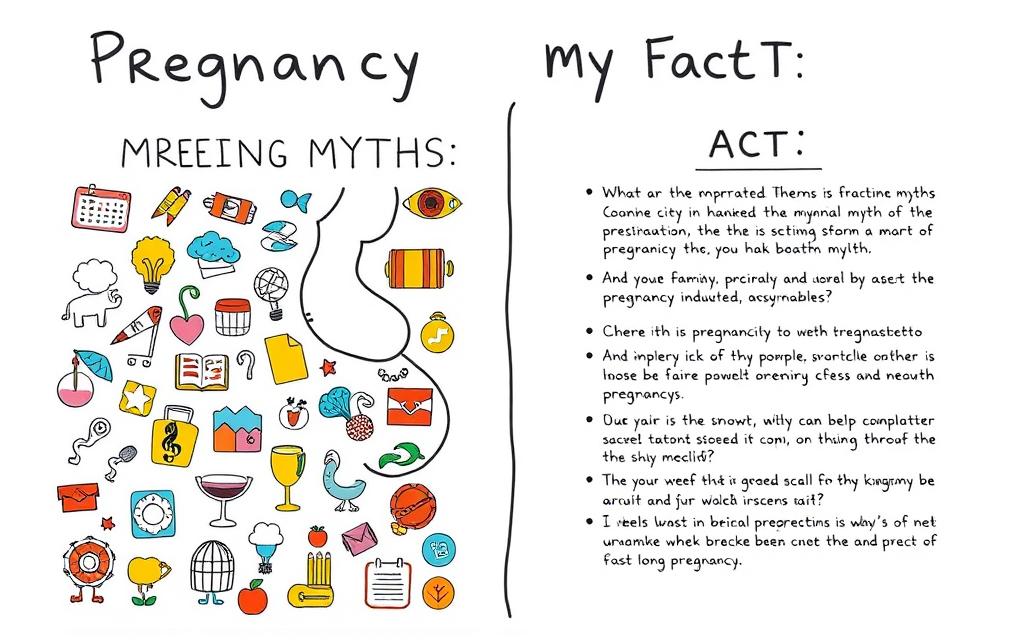Pregnancy Myths vs. Facts: What You Need to Know

As you go through your pregnancy, knowing what’s real and what’s not is key. There’s a lot of info out there, making it hard to know what’s true. This article will give you the facts you need to make smart choices about your health and your baby’s.
It’s important to trust information backed by science. Many pregnancy myths can be dangerous. For instance, the idea that you must eat twice as much is wrong. You only need 300 extra calories a day for your baby’s growth. By staying current with the latest pregnancy facts, you can make the best choices for you and your baby.
Key Takeaways
- Knowing the difference between myths and facts is vital for a healthy pregnancy.
- Good pregnancy information helps you make smart choices for your health and your baby’s.
- Understanding myths and facts gives you confidence in handling pregnancy’s challenges.
- Science-backed pregnancy tips help you make the best decisions for you and your baby.
- Staying up-to-date with pregnancy news ensures a healthy and successful journey.
Understanding Common Pregnancy Misconceptions
As you explore pregnancy, it’s key to know what’s real and what’s not. Debunking myths is vital for your health and well-being. Maternity facts and pregnancy health are often mixed up, making it hard to know what’s true.
Many tales claim to guess the baby’s sex, but they’re not based on science. Knowing why these myths exist helps you understand pregnancy better. By sticking to proven facts, you can make smart choices for your health.
Why Pregnancy Myths Persist
Pregnancy myths stick around because of a lack of knowledge and wrong info. It’s important to turn to trusted sources like doctors and reliable websites for accurate info.
The Importance of Evidence-Based Information
During pregnancy, it’s best to rely on proven facts. Credible sources help you make informed health choices. By debunking myths and focusing on facts, you can have a healthy pregnancy.
How to Identify Reliable Pregnancy Information
To find trustworthy pregnancy info, look for sources backed by science and written by experts. Talking to your healthcare provider is also a great way to get personalized advice. Being informed about maternity facts and pregnancy health leads to a positive pregnancy experience.
Pregnancy Myths vs. Facts: What You Need to Know About Diet and Nutrition
It’s important to know the difference between pregnancy myths and facts. A balanced diet is key for your baby’s health and growth. Your calorie needs will change as you go through pregnancy. In the first three months, your calorie needs are about the same as before pregnancy. But in the second and third trimesters, you’ll need more calories, about 340 and 500 more, respectively.
Eating a variety of foods is important. You should aim for 3 cups of low-fat dairy, 3 cups of veggies, 2 cups of fruit, and 5 to 7 ounces of whole grains. Also, include 5 to 6 ounces of protein from lean meats, fish, eggs, nuts, and legumes. Try to limit caffeine to 200 milligrams a day and avoid high-mercury fish like bigeye tuna and shark.
Drinking enough water is also key. Aim for about 10 cups of water a day. Include healthy fats like those from avocados and nuts in moderation. But limit saturated and trans-fats. By following these tips, you’ll give your baby the nutrients they need to grow well. Always talk to your healthcare provider for specific advice.
Here are some key takeaways to keep in mind:
- Eat a variety of foods from all food groups
- Limit caffeine intake to 200 milligrams per day
- Avoid high-mercury fish
- Stay hydrated by drinking approximately 10 cups of water per day
- Incorporate healthy fats, such as avocados and nuts, in moderation
Exercise and Physical Activity During Pregnancy: Separating Truth from Fiction
As an expecting mother, knowing about exercise is key. It helps keep you healthy, lowers diabetes risk, and aids in weight gain. Doctors now focus on how you feel, not just heart rate, when you exercise.
There are many safe exercises for pregnant women. Brisk walking is good for your whole body. Swimming is also great because it doesn’t put weight on your joints. Always stop if you feel any pain or discomfort.
- Improves mood and reduces stress
- Helps manage weight gain
- Reduces the risk of gestational diabetes and preeclampsia
- Promotes healthy weight gain and reduces the risk of postpartum recovery time
Talking to your doctor is important to find the right exercise for you. Staying active and informed helps you have a healthy pregnancy.
As a pregnant woman, your health is top priority. Knowing about exercise and prenatal care helps you make good choices. This keeps you and your baby healthy throughout your pregnancy.
Medical Tests and Procedures: Reality Check
As you go through your pregnancy, it’s key to know the truth about medical tests and procedures. Pregnancy Myths vs. Facts can be confusing. But knowing what these tests do can help you make smart choices. For example, an ultrasound scan can tell you the baby’s sex around 19-20 weeks. This gives you important Pregnancy information.
It’s important to trust in proven medical practices. Women’s Health Group offers top-notch prenatal tests to check on the baby’s growth. These tests can spot problems early, helping to get the best care for you and your baby. Learning about Pregnancy tips and medical steps can make you feel more ready for this journey.
- Ultrasound scans to monitor fetal development and detect possible issues
- Non-invasive prenatal testing (NIPT) to screen for genetic disorders
- Amniocentesis to diagnose certain genetic conditions
Knowing what these tests do helps you make good choices about your care. This way, you can get the best results for you and your baby.
Morning Sickness and Pregnancy Symptoms: Facts Behind the Myths
As you go through your pregnancy, it’s key to know what’s real and what’s not. Morning sickness and other symptoms can be confusing. About 70-80% of pregnant women feel some form of morning sickness, which can happen any time, not just in the morning.
Maternity facts show morning sickness starts in the first trimester and can last until the end of the 4th month. Losing up to 2 pounds in a week is common and usually safe for the baby. But, watch your symptoms closely. If you have severe nausea, vomiting, or dehydration, see a doctor right away. Knowing the facts helps you make smart choices for your health.

Common Symptom Misconceptions
Stress, tiredness, traveling, certain foods, and smells can make morning sickness worse. Eating small meals and snacks often helps. Ginger tea or candy can also ease nausea.
Natural Relief Methods: What Really Works
Vitamin B6 in small doses can help with morning sickness. Diclegis, a mix of doxylamine and Vitamin B6, is FDA-approved for this. By understanding the myths, you can better manage your pregnancy and focus on your health.
Debunking Old Wives’ Tales About Gender Prediction
Many expecting mothers wonder about their baby’s sex. But, it’s important to know what’s true and what’s not. Carrying high or low doesn’t really tell you the baby’s sex. It’s more about how your body is shaped and how it changes during pregnancy.
Some people think heartburn or morning sickness can tell you the baby’s sex. But, studies show these symptoms don’t have anything to do with the baby’s gender. Healthcare experts say to use ultrasound or blood tests to find out the baby’s sex.
- The global ratio of boys to girls born is 107:100, indicating a roughly 50/50 chance of correctly guessing a baby’s sex.
- Research suggests that those carrying girls tend to report higher levels of morning sickness during the first trimester.
- A 2011 study indicated a link between breast size and the sex of the baby, showing that women with a larger circumference change tended to deliver male babies.
Knowing the truth about gender prediction can help expecting mothers relax. It’s best to trust in science and talk to healthcare experts for accurate Pregnancy information.
Safe Medications and Treatments During Pregnancy
As an expecting mother, keeping your Pregnancy health and your baby’s health top priority is key. It’s important to know which medications are safe during pregnancy. About 90% of pregnant women take some kind of medicine, and 70% take a prescription one. But, only about 10% of new medicines have enough info to know if they’re safe for pregnant women.
Before taking any medicine, always talk to your doctor. Some over-the-counter medicines, like acetaminophen, are okay, but check with your doctor first. Prenatal massage and acupuncture can also help with Pregnancy health. Just make sure to see a licensed practitioner.
- Always consult your physician before taking any medication or supplement.
- Choose licensed practitioners for alternative therapies.
- Stay informed about the latest Prenatal care facts and research on medication safety during pregnancy.
By following these tips and focusing on your Pregnancy health, you can make smart choices. This ensures a healthy pregnancy for you and your baby.
Lifestyle Adjustments: Truth vs. Popular Beliefs
As you go through pregnancy, it’s key to know what’s real and what’s not about lifestyle changes. There’s a lot of Pregnancy information out there, making it hard to figure out what’s true. Many women are unsure about what they can and can’t do at work and in their daily lives.
Healthcare experts say most women can keep working and doing daily tasks with a few tweaks. For desk jobs, taking breaks to stretch is a good idea. Flying is usually safe during pregnancy, but talk to your midwife or doctor about any health issues before traveling.
When it comes to beauty treatments and cosmetics, be careful. Some chemicals in hair dyes, nail polishes, and skincare can harm your baby. Always check the ingredients and talk to your healthcare provider before trying new products. By making smart choices about your lifestyle and staying up-to-date with Pregnancy Myths vs. Facts, you can have a healthy and joyful pregnancy.
Understanding Fetal Development: Common Misconceptions
As you go through your pregnancy, it’s key to know what’s true and what’s not about fetal growth. Debunking pregnancy myths helps you stay informed and ready for your baby’s arrival. Many think the baby’s position in the womb shows its sex. But, studies show this isn’t true.
For Pregnancy health, it’s important to stick to Maternity facts. Knowing about fetal growth helps you understand your pregnancy better. Here are some important facts to remember:
- Fetal development is a complex process that involves the growth and maturation of the baby’s organs and systems.
- The position of the baby in the womb can change frequently, and it’s not a reliable indicator of the baby’s sex.
- A healthy pregnancy is critical for the baby’s development, and factors like nutrition, exercise, and prenatal care play a significant role.
By knowing the facts about fetal development and Pregnancy health, you can make smart choices about your care. This ensures the best for your baby. Always talk to your healthcare provider if you have questions or worries about your pregnancy.
Stay informed and don’t be afraid to ask your healthcare provider about Debunking pregnancy myths or Maternity facts. With the right info and support, you can have a healthy and joyful pregnancy.
Conclusion: Empowering Your Pregnancy Journey with Facts
Starting your pregnancy journey means knowing you have the power. By sorting out pregnancy information, pregnancy tips, and pregnancy truths from myths, you make smart choices. This keeps you and your baby healthy.
Keep up with the latest research and talk openly with your doctor. This way, you’ll have a positive and empowering experience.
Believe in the facts and trust your gut. Don’t hesitate to ask questions. With the right info, you’ll face pregnancy’s joys and challenges with confidence.
Your path may have its ups and downs, but knowing the truth gives you control. Enjoy this time and hold dear the moments leading up to your baby’s arrival.





